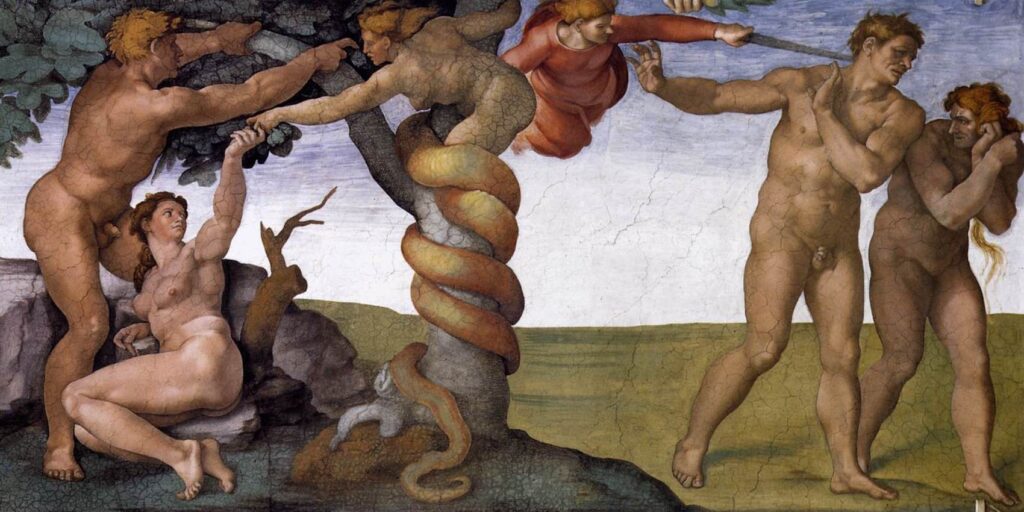
As the Bible tells it, humanity’s original sin was eating forbidden fruit from the tree of knowledge, thus generating awareness of good and evil. Essentially, this story is about the emergence of self-conscious free will and how it represents a separation from God. Accordingly, the story goes, God banished humanity from the Garden of Eden and forced us into damnation, a worldly existence of desire, temptation, and suffering.
As mythologically entertaining as it is, this parable touches on a human reality, but obliquely. For men, it’s been a convenient excuse to degrade and dismiss the role of women and cast them as cursed by Eve’s succumbing to desire. Overall, it evades the direct truth of humanity’s original sin – not the knowledge of good and evil – but the knowledge of predation. We’re killers.
Like all animals, we must eat the forbidden fruit – other living things – to survive; a full belly satisfies the most basic of our desires. Layered over our predatory sin, we’ve constructed a vast and complex system of exploitative socio-political economies. In modern times, this means growing and slaughtering billions of other living things and developing innumerable ways to facilitate it. The development of money, banking, nation-states, military forces, transportation systems, communication tools, and even education support our complicity in elaborating upon the original sin of predation.
Insofar as the tree of knowledge is concerned, we repeatedly commit the original sin without fully acknowledging our culpability as the world’s apex predator. Thus the serpent of guilt hides in the subconscious and reemerges in behavior directed towards others and self – dominance and submission, masochism and sadism – while we consciously employ rationales of continuous predation. Consumerism is sublimated predation dressed-up in a socially acceptable costume of business rules, regulations, customs and traditions.
We’re killers, yes, but also lovers. Occasionally we feel the sin of predation; we know it’s wrong but can’t help ourselves. We see ourselves headed over a cliff but won’t stop. This is the burden of freedom; the guilt of our sublimated predation has generated global neurosis. Mostly, we make excuses, manifested as cultural fixations and rational behaviors. Our obsession with food – what to buy, what to eat, how to prepare and cook it – is an example. That America spends $842 billion yearly on its military is another.
In this way, the insane becomes normal while remaining insane, i.e. Doublethink. Although we’ve certainly tried, we can’t reason our way out of this. Political parties, religions, styles of government, and the very best minds of every generation have ceaselessly failed to wrestle with the emotional dilemma set forth in the Bible: We are predators. We kill to eat. Deal with it.
Predation comes easy for us; dealing with it is the hard part. Psychologically, we’re a mess. Our original sin has driven us mad, and although we know it, what to do about it eludes us. We distract ourselves from the truth of our situation, but the psychology of individual survival is difficult and social psychology isn’t any easier. Ask the Ukrainians.
It’s said the first step in healing psychologically is to admit you’ve got a problem, and we’ve got a predation problem. To give into it is to empower our sadistic side; giving in to desire, however, is what we must do. It’s a quandary. Every day we’re hungry, and prolonged hunger creates suffering.
Ultimately, human survival relies not on simply political, spiritual, or rational solutions, but emotional-psychological ones.